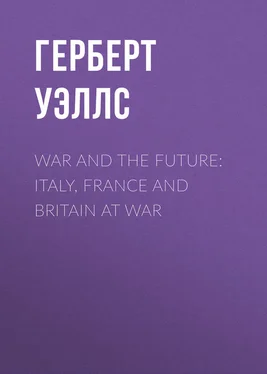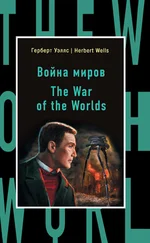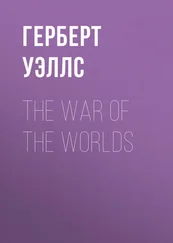Герберт Уэллс - War and the Future - Italy, France and Britain at War
Здесь есть возможность читать онлайн «Герберт Уэллс - War and the Future - Italy, France and Britain at War» — ознакомительный отрывок электронной книги совершенно бесплатно, а после прочтения отрывка купить полную версию. В некоторых случаях можно слушать аудио, скачать через торрент в формате fb2 и присутствует краткое содержание. Жанр: История, foreign_prose, prose_military, на английском языке. Описание произведения, (предисловие) а так же отзывы посетителей доступны на портале библиотеки ЛибКат.
- Название:War and the Future: Italy, France and Britain at War
- Автор:
- Жанр:
- Год:неизвестен
- ISBN:нет данных
- Рейтинг книги:4 / 5. Голосов: 1
-
Избранное:Добавить в избранное
- Отзывы:
-
Ваша оценка:
- 80
- 1
- 2
- 3
- 4
- 5
War and the Future: Italy, France and Britain at War: краткое содержание, описание и аннотация
Предлагаем к чтению аннотацию, описание, краткое содержание или предисловие (зависит от того, что написал сам автор книги «War and the Future: Italy, France and Britain at War»). Если вы не нашли необходимую информацию о книге — напишите в комментариях, мы постараемся отыскать её.
War and the Future: Italy, France and Britain at War — читать онлайн ознакомительный отрывок
Ниже представлен текст книги, разбитый по страницам. Система сохранения места последней прочитанной страницы, позволяет с удобством читать онлайн бесплатно книгу «War and the Future: Italy, France and Britain at War», без необходимости каждый раз заново искать на чём Вы остановились. Поставьте закладку, и сможете в любой момент перейти на страницу, на которой закончили чтение.
Интервал:
Закладка:
H. G. Wells
War and the Future: Italy, France and Britain at War
THE PASSING OF THE EFFIGY
1
One of the minor peculiarities of this unprecedented war is the Tour of the Front. After some months of suppressed information – in which even the war correspondent was discouraged to the point of elimination – it was discovered on both sides that this was a struggle in which Opinion was playing a larger and more important part than it had ever done before. This wild spreading weed was perhaps of decisive importance; the Germans at any rate were attempting to make it a cultivated flower. There was Opinion flowering away at home, feeding rankly on rumour; Opinion in neutral countries; Opinion getting into great tangles of misunderstanding and incorrect valuation between the Allies. The confidence and courage of the enemy; the amiability and assistance of the neutral; the zeal, sacrifice, and serenity of the home population; all were affected. The German cultivation of opinion began long before the war; it is still the most systematic and, because of the psychological ineptitude of the Germans, it is probably the clumsiest. The French Maison de la Presse is certainly the best organisation in existence for making things clear, counteracting hostile suggestion, the British official organisations are comparatively ineffective; but what is lacking officially is very largely made up for by the good will and generous efforts of the English and American press. An interesting monograph might be written upon these various attempts of the belligerents to get themselves and their proceedings explained.
Because there is perceptible in these developments, quite over and above the desire to influence opinion, a very real effort to get things explained. It is the most interesting and curious – one might almost write touching – feature of these organisations that they do not constitute a positive and defined propaganda such as the Germans maintain. The German propaganda is simple, because its ends are simple; assertions of the moral elevation and loveliness of Germany; of the insuperable excellences of German Kultur, the Kaiser, and Crown Prince, and so forth; abuse of the “treacherous” English who allied themselves with the “degenerate” French and the “barbaric” Russians; nonsense about “the freedom of the seas” – the emptiest phrase in history – childish attempts to sow suspicion between the Allies, and still more childish attempts to induce neutrals and simple-minded pacifists of allied nationality to save the face of Germany by initiating peace negotiations. But apart from their steady record and reminder of German brutalities and German aggression, the press organisations of the Allies have none of this definiteness in their task. The aim of the national intelligence in each of the allied countries is not to exalt one’s own nation and confuse and divide the enemy, but to get a real understanding with the peoples and spirits of a number of different nations, an understanding that will increase and become a fruitful and permanent understanding between the allied peoples. Neither the English, the Russians, the Italians, nor the French, to name only the bigger European allies, are concerned in setting up a legend, as the Germans are concerned in setting up a legend of themselves to impose upon mankind. They are reality dealers in this war, and the Germans are effigy mongers. Practically the Allies are saying each to one another, “Pray come to me and see for yourself that I am very much the human stuff that you are. Come and see that I am doing my best – and I think that is not so very bad a best…” And with that is something else still more subtle, something rather in the form of, “And please tell me what you think of me – and all this.”
So we have this curious byplay of the war, and one day I find Mr. Nabokoff, the editor of the Retch , and Count Alexy Tolstoy, that writer of delicate short stories, and Mr. Chukovsky, the subtle critic, calling in upon me after braving the wintry seas to see the British fleet; M. Joseph Reinach follows them presently upon the same errand; and then appear photographs of Mr. Arnold Bennett wading in the trenches of Flanders, Mr. Noyes becomes discreetly indiscreet about what he has seen among the submarines, and Mr. Hugh Walpole catches things from Mr. Stephen Graham in the Dark Forest of Russia. All this is quite over and above such writing of facts at first hand as Mr. Patrick McGill and a dozen other real experiencing soldiers – not to mention the soldiers’ letters Mr. James Milne has collected, or the unforgettable and immortal Prisoner of War of Mr. Arthur Green – or such admirable war correspondents’ work as Mr. Philip Gibbs or Mr. Washburne has done. Some of us writers – I can answer for one – have made our Tour of the Fronts with a very understandable diffidence. For my own part I did not want to go. I evaded a suggestion that I should go in 1915. I travel badly, I speak French and Italian with incredible atrocity, and am an extreme Pacifist. I hate soldiering. And also I did not want to write anything “under instruction”. It is largely owing to a certain stiffness in the composition of General Delme-Radcliffe is resolved that Italy shall not feel neglected by the refusal of the invitation from the Comando Supremo by anyone who from the perspective of Italy may seem to be a representative of British opinion. If Herbert Spencer had been alive General Radcliffe would have certainly made him come, travelling-hammock, ear clips and all – and I am not above confessing that I wish that Herbert Spencer was alive – for this purpose. I found Udine warm and gay with memories of Mr. Belloc, Lord Northcliffe, Mr. Sidney Low, Colonel Repington and Dr. Conan Doyle, and anticipating the arrival of Mr. Harold Cox. So we pass, mostly in automobiles that bump tremendously over war roads, a cloud of witnesses each testifying after his manner. Whatever else has happened, we have all been photographed with invincible patience and resolution under the direction of Colonel Barberich in a sunny little court in Udine.
My own manner of testifying must be to tell what I have seen and what I have thought during this extraordinary experience. It has been my natural disposition to see this war as something purposeful and epic, as it is great, as an epoch, as “the War that will end War” – but of that last, more anon. I do not think I am alone in this inclination to a dramatic and logical interpretation. The caricatures in the French shops show civilisation (and particularly Marianne) in conflict with a huge and hugely wicked Hindenburg Ogre. Well, I come back from this tour with something not so simple as that. If I were to be tied down to one word for my impression of this war, I should say that this war is Queer. It is not like anything in a really waking world, but like something in a dream. It hasn’t exactly that clearness of light against darkness or of good against ill. But it has the quality of wholesome instinct struggling under a nightmare. The world is not really awake. This vague appeal for explanations to all sorts of people, this desire to exhibit the business, to get something in the way of elucidation at present missing, is extraordinarily suggestive of the efforts of the mind to wake up that will sometimes occur at a deep crisis. My memory of this tour I have just made is full of puzzled-looking men. I have seen thousands of poilus sitting about in cafes, by the roadside, in tents, in trenches, thoughtful. I have seen Alpini sitting restfully and staring with speculative eyes across the mountain gulfs towards unseen and unaccountable enemies. I have seen trainloads of wounded staring out of the ambulance train windows as we passed. I have seen these dim intimations of questioning reflection in the strangest juxtapositions; in Malagasy soldiers resting for a spell among the big shells they were hoisting into trucks for the front, in a couple of khaki-clad Maoris sitting upon the step of a horse-van in Amiens station. It is always the same expression one catches, rather weary, rather sullen, inturned. The shoulders droop. The very outline is a note of interrogation. They look up as the privileged tourist of the front, in the big automobile or the reserved compartment, with his officer or so in charge, passes – importantly. One meets a pair of eyes that seems to say: “Perhaps you understand…
Читать дальшеИнтервал:
Закладка:
Похожие книги на «War and the Future: Italy, France and Britain at War»
Представляем Вашему вниманию похожие книги на «War and the Future: Italy, France and Britain at War» списком для выбора. Мы отобрали схожую по названию и смыслу литературу в надежде предоставить читателям больше вариантов отыскать новые, интересные, ещё непрочитанные произведения.
Обсуждение, отзывы о книге «War and the Future: Italy, France and Britain at War» и просто собственные мнения читателей. Оставьте ваши комментарии, напишите, что Вы думаете о произведении, его смысле или главных героях. Укажите что конкретно понравилось, а что нет, и почему Вы так считаете.

![Герберт Уэллс - The War of the Worlds [С англо-русским словарем]](/books/26611/gerbert-uells-the-war-of-the-worlds-s-anglo-thumb.webp)










